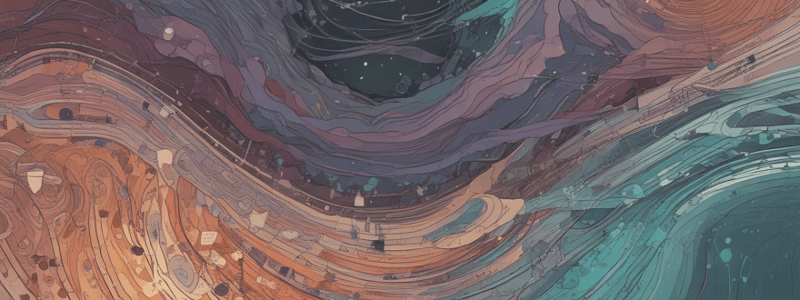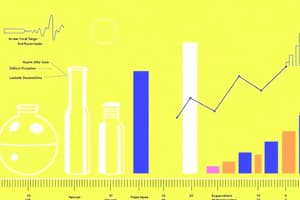Podcast
Questions and Answers
What is the primary purpose of an experimental design?
What is the primary purpose of an experimental design?
- To establish a scientific theory
- To define variables and assign subjects
- To create controlled conditions for an experiment to limit outside interference (correct)
- To create a hypothesis
What is the relationship between the independent and dependent variables in an experiment?
What is the relationship between the independent and dependent variables in an experiment?
- The dependent variable is manipulated, and the independent variable is measured
- They have no relationship with each other
- They are interchangeable terms
- The independent variable is manipulated, and the dependent variable changes as a result (correct)
What is the main difference between a scientific theory and a scientific law?
What is the main difference between a scientific theory and a scientific law?
- A scientific theory is a pattern, while a scientific law is an explanation
- A scientific theory is a proven fact, while a scientific law is a hypothesis
- A scientific theory is a hypothesis, while a scientific law is a proven fact
- A scientific law is a pattern, while a scientific theory is an explanation (correct)
What is the importance of using proper equipment in an experiment?
What is the importance of using proper equipment in an experiment?
What is the ultimate goal of conducting an experiment through an experimental design?
What is the ultimate goal of conducting an experiment through an experimental design?
What is the purpose of the dependent variable in an experiment?
What is the purpose of the dependent variable in an experiment?
What was the purpose of the placebo group in the pharmaceutical company's experiment?
What was the purpose of the placebo group in the pharmaceutical company's experiment?
What is the role of the experimenter in an experiment?
What is the role of the experimenter in an experiment?
What type of data were collected in the plant experiment?
What type of data were collected in the plant experiment?
What is the first step in creating a good experiment for science?
What is the first step in creating a good experiment for science?
What is the primary reason for conducting an experiment through the scientific method?
What is the primary reason for conducting an experiment through the scientific method?
What is the purpose of a hypothesis in the experimental design process?
What is the purpose of a hypothesis in the experimental design process?
What is the difference between the independent variable and the dependent variable in an experiment?
What is the difference between the independent variable and the dependent variable in an experiment?
What is the role of the control group in an experiment?
What is the role of the control group in an experiment?
What is the purpose of random assignment in an experiment?
What is the purpose of random assignment in an experiment?
Flashcards are hidden until you start studying
Study Notes
Experimental Design
- Experimental design is a method to test a hypothesis through a series of steps, creating controlled conditions to limit outside interference.
- The purpose is to form a conclusion based on the hypothesis, which can lead to supporting evidence of scientific law and theory.
Variables
- Independent variable: manipulated in an experiment, causing a change in the dependent variable.
- Dependent variable: changes as an effect of the independent variable being changed.
- Control variable: remains unchanged, providing a baseline for comparison.
Scientific Theory and Law
- Scientific theory: explains why things occur the way they do, supported by evidence from repeated experiments.
- Scientific law: a pattern, typically established through an equation, supported by data from repeated experiments.
What Makes a Good Experiment
- A good experiment requires background knowledge, proper equipment, and attention to accuracy and precision.
- Accuracy: how close values collected are to the real value.
- Precision: how close all measurements are to one another.
Experimental Design Process
- Step 1: Define Variables - identify independent, dependent, and control variables.
- Step 2: Formulate a Hypothesis - make an educated guess about the experiment's outcome.
- Step 3: Experimental Design - create a treatment group and a control group.
- Step 4: Assign Subjects - randomly select and assign subjects to groups.
- Step 5: Measure the Dependent Variable - collect data and analyze results.
Example of an Experimental Investigation
- Pharmaceutical company conducts an experiment to test a medication's effectiveness.
- Two groups: treatment group receives the medication, placebo group receives a dummy pill.
- Data collected shows positive results for patients in the treatment group, confirming the medication's effectiveness.
Studying That Suits You
Use AI to generate personalized quizzes and flashcards to suit your learning preferences.




